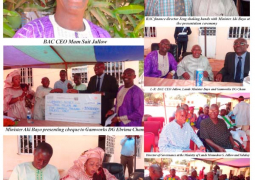
The project is to be implemented in 24 health facilities and 400 communities in the Upper River, Central River and North Bank West health regions.
Speaking at the launching, Health and Social Welfare Minister Dr Omar Sey said in spite of remarkable achievements registered, the country is still facing a number of challenges, such as high rates of malnutrition, especially among children.
Despite those challenges, he noted, some improvements have been registered in the area of maternal and child health and nutrition.
The “Maternal and Child Nutrition and Health Results Project (MCNHRP) amounting to $8.68 million is expected to support the long term objectives of reducing maternal and child mortality and under-nutrition and thereby contribute to the attainment of MDGs 1c, 4 and 5,” he announced.
“It is of paramount importance that the project interventions will focus on strengthening community structures and the PHC system to enhance the quality and quantity of services by empowering individual women, communities and frontline health workers to improve uptake, participation, caring practices and accountability for maternal and child nutrition and health outcomes,” Minister Sey further stated.
To achieve the expected improvement in health and nutrition outcomes, this project would prioritize interventions directly linked to the reduction of maternal and child under-nutrition, morbidity and mortality, he said.
Undoubtedly, he added, there is a strong commitment from the Ministry to uphold and nurture the concept and practicality of the RBF approach, which has produced tangible evidence of substantial benefits and cost effectiveness as shown in countries such as Burundi, Rwanda and Zimbabwe.
Dr. Sey promised that his ministry would leave no stone unturned in ensuring the successful implementation of the project at all levels of care, adding that personally he would ensure that all the systems that have a direct bearing on the project are well articulated to effectively and efficiently deliver the required services.
He commended his staff and the National Nutrition Agency for securing the project with support from the World Bank.
Rifat Hasan, task team leader for the project and World Bank representative, in her statement, said the aim of the project is to improve the health and nutrition status of women and children by strengthening and expanding primary health care and community nutrition.
The Gambia government and the Bank started to discuss the challenges in the health and nutrition sectors as far back as 2012, she said, adding that at that time the government and the Bank were partnering in the nutrition sector through the Rapid Response Nutrition Security Improvement Project – implemented by the National Nutrition Agency.
The entire world has experienced some rocky economic developments since 2007, including the global food price crisis in 2008, she stated, pointing out that these global crises generated local concerns about the likely impact on the nutrition of young children in vulnerable households in The Gambia.
These global developments and local concerns provided the backdrop to strengthen the country’s capacity to deal with the aftermath of such external shocks, she added.
“A healthy child needs a healthy mother to nurture it during pregnancy and care for it during infancy and childhood,” she further stated.
A new approach is needed to boost appropriate action and turn the tide in favour of improved women and children’s nutrition and health, she continued.
The project is innovative in the way that it focuses on and pays for results, stated the World Bank representative, who added that the project is relevant in the way it addresses key bottlenecks at community level and in the health system..
“The project focuses on strengthening both primary health care and community nutrition,” she went on, adding that it would improve data reporting and information systems, strengthen supply chains, and increase accountability to enable health providers to deliver better services.


